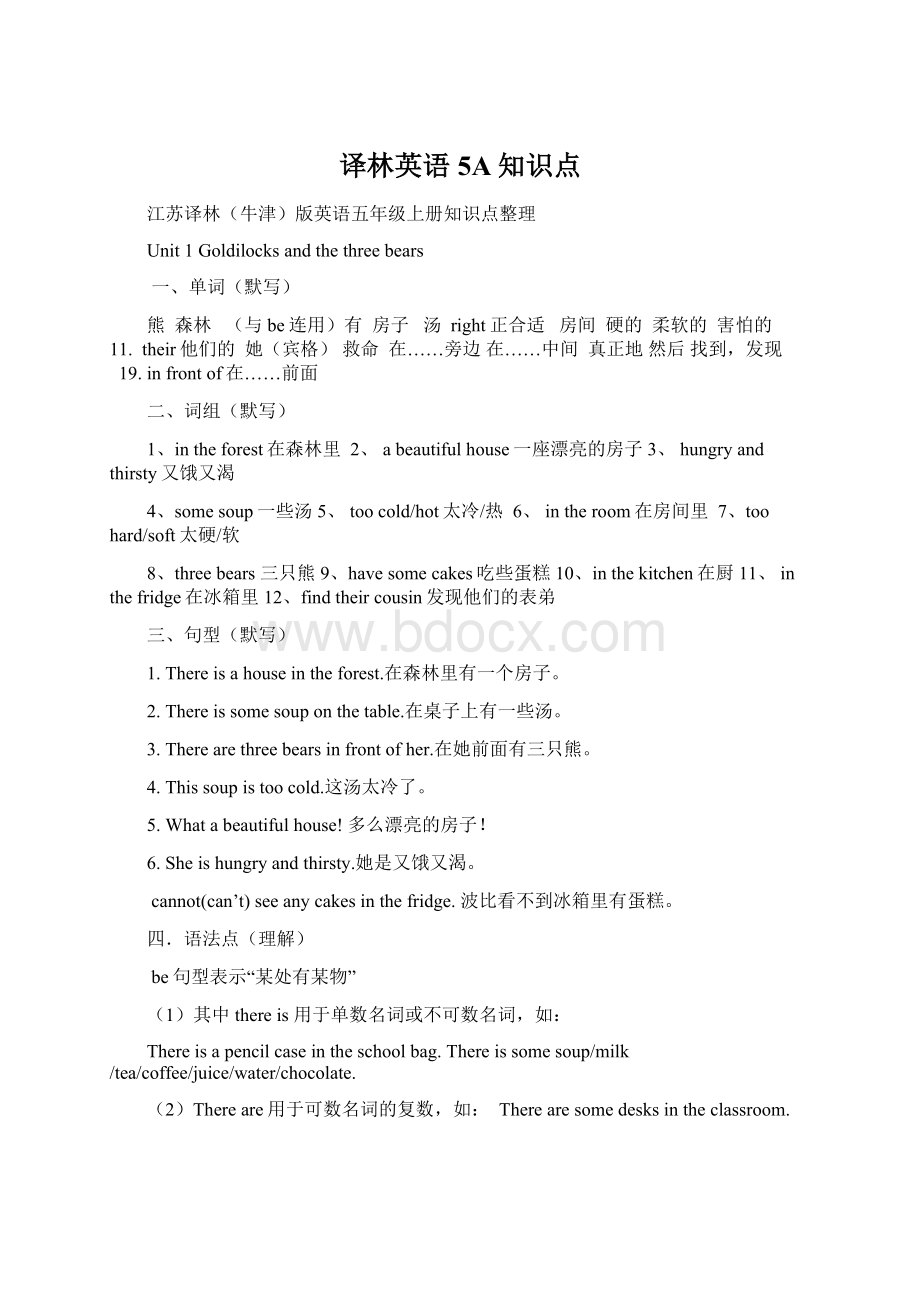译林英语5A知识点Word文档下载推荐.docx
《译林英语5A知识点Word文档下载推荐.docx》由会员分享,可在线阅读,更多相关《译林英语5A知识点Word文档下载推荐.docx(14页珍藏版)》请在冰豆网上搜索。

Therearesomepicturesandatelephone.Thereisatelephoneandsomepictures.
be句型的否定形式:
在be动词的后面加not(isnot可以缩写为isn'
t,arenot可以缩写为aren'
t)把some改成any。
例:
Thereisapencilinthepencil-box.(改为否定句)Thereisn'
tapencilinthepencil-box.
Therearesomecrayonsonthedesk.(改为否定句)Therearen'
tanycrayonsonthedesk.
3.“some”和“any”都有“一些”的意思.“some”一般用于肯定句,“any”用于否定句和一般疑问句。
但在一些表示委婉请求,想得到对方肯定回答的疑问句中,也用“some”.
aresomewatermelonsinthebasket.(肯定句)
aren'
tanybirdsinthetree.(否定句)
thereanytoytrainsonthetable(疑问句)
youlikesometea(表委婉请求)
在否定句中的用法:
表示某人不能做某事时,通常在can后面加否定词not,后面加动词原形。
Bobbycannot(can’t)seeanycakesinthefridge.
5.感叹句的结构:
感叹句常用how或what来引导
(1)what引导的感叹句
+a/an+形容词+可数名词单数!
Whatabeautifulhouse!
+形容词+可数名词复数!
Whatnicedresses!
c.What+形容词+不可数名词!
Whatdeliciousmilk!
(2)how引导的感叹句
How+形容词/副词!
Hownice!
Unit2
Anewstudent
学生
教室
楼层
电脑
5.first第一,首先
第二
第三
操场
秋千
推
重的
停下
高的
很多的,极大的
newstudent一名新学生
……around带领……参观
manyclassrooms多少间教室
ourschool在我们学校里
computerrooms一些电脑室
musicroom一间音乐室
thethirdfloor在三楼
8.atabletennisroom一间乒乓球室
andhavealook去看看
anddance又唱又跳
somenicejuice喝些美味的果汁
tothecinema去电影院
aniceicecream吃一个美味的冰淇淋theplayground在操场上
andplay去玩一玩
theswing在秋千上
heavy真的重
high太高
fun很有趣
again.再玩一次
home回家
artroom一间美术室
youshowheraround你能带领她参观吗?
manyclassroomsarethereinourschool在我们学校有多少间教室?
classroomisonthesecondfloor.我们教室在二楼。
thereanycomputerrooms有一些电脑室吗?
thereamusicroom有电脑室吗?
’sgoandhavealook.让我们去看看。
四、语法点(理解)
many...(可数名词复数)arethere...用于询问某处有多少...
Howmanyclassroomsarethereinourschool?
be的一般疑问句,是将be动词提前到there的前面,表示“有......”
(1)Isthere...
Yes,thereis./No,thereisn’t.
Isthereamusicroom?
(2)Arethereany...
Yes,thereare./No,therearen’t.
Arethereanybooks?
3.几个缩写isn’t=isnot
aren’t=arenot
it’s=itis
they’re=theyare
4.序数词
one-----first
two---second
three----third
four---fourth
five---fifth
six---sixth
5.在楼层前用介词on,
onthefirst/second/thirdfloor
在一/二/三楼...
Unit3Ouranimalfriends
一、词汇
ouranimalfriends
我们的动物朋友
twofish
两条鱼
theother另一个
abigtail一条大尾巴
bigbodies
大身体
haveno
没有
fourlegs
四条腿
nicewings漂亮的翅膀
redeyes
红眼睛
longears
长耳朵
bigarms
大手臂
bigfeet
大脚
itsbody
它的身体
yourfingers
你的手指
onthefarm
在农场上
☆baldeagles白头秃鹰
☆polarbears
北极熊
☆abigkangaroo
一只袋鼠
☆inCanada在加拿大
☆inAustralia
在澳大利亚
☆liketherain喜欢下雨
☆sunnyweather晴朗的天气
☆comeout
出来
☆carryanumbrella拿一把雨伞
二、句型
1.Ihavetwoanimalfriends.
我有两个动物朋友。
2.Oneisredandtheotherisblack.一个是红的另一个是黑的。
3.Theyhavebigeyesandbigbodies.
它们有大眼睛和大身体。
4.Theyhavenolegsandarms.它们没有腿和手臂。
5.Ithasfourlegsandashorttail.他有四条腿和一条短尾巴。
6.Ithastwolegsandtwonicewings.它有两条腿和一双漂亮的翅膀。
7.Hehasadog.他有一只狗。
8.Shehasabird.
她有一只鸟。
9.Itcantalkandfly.
它既会说话又会飞。
10.Doyouhaveananimalfriend
Yes,Ido.你有一个动物朋友吗
是的,我有。
11.Doesithavealongtail
Yes,itdoes.它有一条长尾巴吗
是的,它有。
12.DoeshehaveaparrotNo,hedoesn’t.
他有一只鹦鹉嘛
不,他没有。
13.DoesshehavetwofishNo,shedoesn’t.
她有两条鱼吗不,她没有。
14.DotheyhaveanimalfriendsNo,theydon’t.他们有动物朋友吗
不,他们没有。
15.Thosearenotlegs.
那些不是腿。
16.Giveitacake.给它一个蛋糕。
三、语音
Uu/Λ/bus,duck,summer,sun,umbrella,mum,lunch,cup,rubber,run,but,much,jump,
Sunday,subject,
四、语法
have/has
的用法
1、表示某人有某物。
2、主语是第一、第二人称单数和复数时用have,如I,you,we,they,thestudents…
主语是第三人称单数时用has,如he,she,it,Helen,thebird,myfather
…
3、肯定句:
…have/has…
WehaveaPElessononMondaymorning.
/
Ithasalongtail.
否定句:
…don’t/doesn’t
+have…
Theydon’thaveanimalfriends.
Shedoesn’thaveadog.
一般疑问句:
Do/Does…have…
Yes,…do/does.
No,…don’t/don’t.
Doyouhaveafootball
Yes,Ido.
No,Idon’t.
Doeshehaveatoycar
Yes,hedoes.
No,hedoesn’t.
Unit4Hobbies
singanddance唱歌跳舞
begoodat擅长于
withmybrother和我弟弟
readstories
读故事
inthepark在公园里
playthepiano
弹钢琴
alotof
许多
watchfilms
看电影
talkabout
谈论某事
myhobby
我的爱好
theirhobbies他们的爱好
inwinter在冬天
verywell
很好
anidea
一个主意
agreatidea一个好主意
thisafternoon
今天下午
ontheice在冰上
begoodatskating擅长溜冰
abighole一个大洞
intheice在冰里
coldandwet又冷又湿
likeclimbing喜欢爬山
likeswimming喜欢游泳
likedrawing喜欢画画
playbasketball打篮球
playtabletennis打乒乓
playfootball踢足球
1.Whatdoyoulikedoing
你喜欢干什么?
Ilikeplayingbasketballandfootball.
我喜欢打篮球和踢足球。
2.Icanplaybasketballwell,butI’mnotgoodatfootball.我篮球打得很好,但我不擅长足球。
3.Helikesplayingfootballtoo.他也喜欢踢足球。
4.Shealsolikesplayingthepiano.
她也喜欢弹钢琴。
5.Theybothlikeswimming.
她们都喜欢游泳。
6.Whatdoeshelikedoing
他喜欢干什么?
Helikesdrawing.
他喜欢画画。
7.Whatdoesshelikedoing
她喜欢干什么?
Shelikesreadingstories.她喜欢读故事。
8.Whatdotheylikedoing
她们喜欢干什么?
Theylikewatchingfilms.她们喜欢看电影。
9.SamandBillytalkingabouttheirhobbies.山姆和比利谈论他们的爱好。
10.Let’sgoskatingthisafternoon.咱们今天下午去滑冰。
11.Lookout!
小心!
12.Thereisaholeintheice.冰里有一个洞。
youlikewearingyellow
你喜欢穿黄色的衣服?
14.Wealllikeclimbingverymuch.
我们都十分喜欢爬山。
Yy/j/
year,yes,yellow,you,young
四、语法
1.询问别人喜欢干某事,Whatdo/does…likedoing
喜欢干某事
likedoingsth,
doing表示喜欢经常做一件事。
主语是第三人称单数时注意like后面加s.
不喜欢干某事don’t/doesn’tlikedoingsth
2.动名词的变化规律:
a.一般情况下在动词后面加ing.如going,reading,drawing,playing…
b.以不发音的字母e结尾的动词,去e再加ing.如dancing,making…
c.以“元音+辅音”结尾的重读闭音节单词,先双写辅音字母再加ing.如swimming,running,getting,putting…
Unit5
Whatdotheydo
【单词】
acook
一个厨师
adoctor一个医生
adriver
一个驾驶员
afarmer
一个农民
anurse
一个护士
apoliceman一个警察
ateacher
一个老师
aworker一个工人
1.teacher
老师
2.teach
教
3.writer作家
写
工作
home在家
医生
帮助
生病
人,人们
工厂
工人
厨师
驾驶员,司机
农民
护士
警察
【词组】
1.teachEnglish教英语
2.alotofstudents=lotsofstudents许多学生
3.Whatabout...=Howabout....
....怎么样
4.anEnglishteacher一位英语教师
5.writestories
写故事
6.workathome在家工作
7.helpsickpeople帮助生病的人
8.afactoryworker一个工厂工人
9.makesweets做糖果
10.alotofsweets许多糖果
11.anicecar一辆漂亮的小汽车
12.makecars制造汽车
13.somanycars这么多汽车
14.flyinthesky在空中飞
15.Iwish我希望
【句子】
1.Whatdoesyourfatherdo
你的爸爸做什么的?
2.Myfatherisateacher.我的爸爸是个老师。
3.HeteachesEnglish.
他教英语。
4.Hehasalotofstudents.
他有许多学生。
5.Whataboutyourmother
你妈妈呢?
6.IssheanEnglishteachertoo
她也是个英语老师吗?
7.She’sawriter.
她是个作家。
8.Shewritesstories.
她写故事的。
9.Sheworksathome.
她在家工作。
10.Myfatherisadoctor.
我的爸爸是个医生。
11.Hehelpssickpeople.
他帮助生病的人。
12.Mymotherisafactoryworker.
我的妈妈是个工厂的工人。
13.Shemakessweets.
她做糖果的。
14.Who’sthat
那是谁?
15.Therearesomanycars.
有那么多车。
16.Yourfathercan’tgonow.
你爸爸不能走了现在。
【语法知识】
1.如何询问他人的职业
1)Whatdoes+某人(yourfather,David...)do?
He/Sheisa/an+职业(farmer,teacher,doctor...)
例如:
Whatdoesyourfatherdo
Heisadoctor.你爸爸做什么的
他是一个医生。
还可以这么问他人的职业:
2)Whatis+某人
Whatisyourfather
你爸爸做什么的?
3)What’ssomebody’sjob
What’syourfather’sjob你爸爸做什么的?
2.询问“你”的职业
1)What’syourjob你是做什么的?
IamanEnglishteacher.我是一个英语老师。
2)Whatdoyoudo
你是做什么的
Iamaworker.
我是一名工人。
动词在第三人称单数形式的变化规则
规则
例词
一般情况下,直接在动词的词尾加-s。
run-runs
look-looks
see-sees
say-says
以-s,-sh,-ch,-x,-o结尾的动词,一般在词尾加-es.
teach-teaches
go-goes
fix-fixes
wash-washes
pass-passes
以辅音字母加y结尾的动词,先边y为i,再加-es.
study-studies
try-tries
以元音字母加y结尾的动词,直接在词尾加-s。
play-plays
stay-stays
注意:
go(三单)——goes
have(三单)——has
五、作文Myfamily
Therearethreepeopleinmyfamily.Theyaremyfather,mymotherandI.Myfatherisateacher.Heworksinaschool.Hegoestoschoolbycar.Mymotherisadoctor.Sheworksinahospital.Shehel